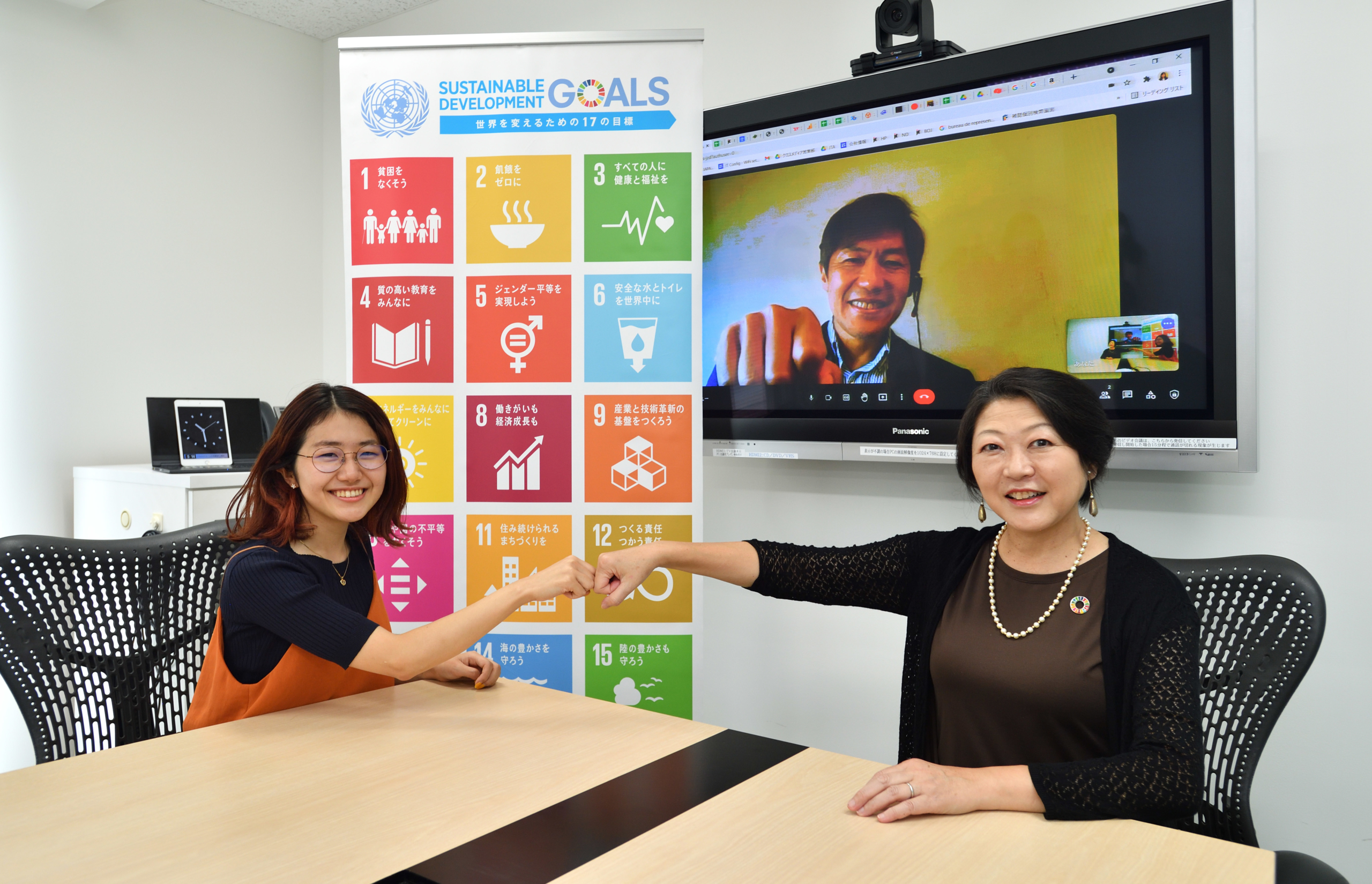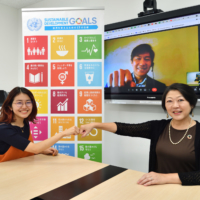The latest Intergovernmental Panel on Climate Change (IPCC) report was released in August, and the leaders expressed their sense of crisis about the situation more than ever during the United Nations General Assembly in September.
Kaoru Nemoto, director of the United Nations Information Centre in Tokyo, discussed the issues raised in the report with environmental scientist Seita Emori and activist Momoko Nojo, head of No Youth No Japan, a group that aims to raise political participation among the country’s youth. Excerpts of the dialogue follow.
Nemoto: As one of the authors of the sixth IPCC’s assessment report, please tell us the most important points.
Emori: For the first time, the report concluded that human influence on global warming is “unequivocal,” instead of saying there was a “95% likelihood” as before. Human-induced climate change is already affecting climate extremes such as heat waves and heavy rain. The report warns that stabilizing the climate will require strong, rapid and sustained reductions in greenhouse gas emissions, and reaching net-zero emissions of carbon dioxide.
Nemoto: From young people’s point of view, please share your thoughts with us on climate change and how your sense of crisis is leading you to raise political participation among Japanese youth.
Nojo: In the first place, I became aware of climate issues when I learned that our way of living in the current system without thinking about it is affecting people in developing countries and future generations. We young people will live in the era of accelerating climate change toward 2050 and beyond. If we do nothing, the next generations will blame us in our senior years. So I have been involved in activities to increase awareness of the issues, but young people’s voices in Japan are not yet strong enough compared with powerful youth movements overseas.
Nemoto: Have you seen any change in Japan since former Prime Minister Yoshihide Suga pledged in 2020 to achieve net-zero carbon dioxide emissions by 2050?
Nojo: Since the pledge, climate change countermeasures have finally become recognized as a pressing issue that Japan’s national and local governments should address now. I feel that in our conversations with politicians. But many elderly politicians still have the same perception of climate change that they had when the Kyoto Protocol was signed in the 1990s, without updating their scientific knowledge from their student days. They regard the issue as something like a policy for young people, to my disappointment. Also, I think it’s a problem that fewer women than men are involved in the process of formulating climate action plans at each level in Japan.
Emori: The prime minister’s pledge was an important step for Japan. He also set an ambitious target of achieving a 46% cut in greenhouse gas emissions by 2030 from 2013 levels. From my point of view, however, the government’s strategy to achieve these targets mainly relies on fostering new technologies, such as carbon recycling, to improve the competitiveness of Japanese industry. I understand that’s important, but that may prevent us from focusing on the biggest immediate challenge: how to increase renewable energy, mainly solar and wind power, in a way acceptable to society while also creating a balance between supply and demand.
Nojo: I agree. With expectations high for new technologies to solve these situations, today’s abundant lifestyle and its underlying values are not being examined. The detailed goals and targets in the strategies often seem to lean on number-juggling without questioning the root cause of climate change. I hope that discussions will get started to review the current state of industrial society and our way of living itself.
Nemoto: What can we do as individuals to achieve the 2050 carbon neutrality goal?
Emori: Individual good intentions alone won’t produce a big change. But when social systems change, people’s lifestyles will also change. For example, mandatory energy-saving standards for new homes and transportation systems could work to transform our lifestyles.
Nojo: When I became aware of climate change issues, I went vegan because animal husbandry produces carbon dioxide and methane. Now I enjoy cooking vegetables and eat a lot of natto (fermented soybeans). My former classmates, new graduates who have begun working, say they are so busy that they buy light meals at convenience stores for lunch and even in the evening after working overtime. Japanese people are much too busy working to spend time on transforming society and the environment to establish an eco-friendly lifestyle. But I believe that we definitely need such extra time to do so in our everyday lives. In this sense, politics to correct long working hours should play a crucial role.
Nemoto: The Japanese government has taken public comments into consideration about various plans. How are you encouraging young people to make themselves heard?
Nojo: The most important thing is to change the government’s basic energy policy. Although the share of renewable energy in the power sector has increased, it’s not enough. And the draft does not indicate any direction for slashing our reliance on coal-fired power to zero. I’m concerned about people’s waning interest in energy issues in comparison to the aftermath of the March 2011 quake, tsunami and nuclear disaster because energy policy is the basis of our social and economic systems. Under this plan, Japan cannot reduce its carbon dioxide emissions because much of the electricity used in cities, from street lamps to supermarkets and schools, will continue to be generated by coal-fired power plants, even if we individually switch to homes powered by renewable energy. So it’s time for us to raise our voices to change the policy.
Nemoto: In the words of United Nations Secretary-General Antonio Guterres, “The world must end its deadly addiction to coal.” Where is Japan and the world going?
Emori: In Japan, a dozen or two coal-fired plants are under construction. They are supposed to switch from coal to ammonia in the future, which will bring them into alignment with Japan’s decarbonization policy. So far, such green growth strategies have become mainstream worldwide. On the other hand, there is the question of whether it’s really possible to pursue economic growth while also achieving net-zero carbon dioxide emissions using 100% renewable energy. Renewable energy involves complex issues such as material extraction, biodiversity loss and land use. Also, economic growth may only result in growing the disparity between rich and poor worldwide or among different generations. Some argue that we should rethink economic growth itself.
Nemoto: In this context, the U.N. adopted a new framework called the System of Environmental-Economic Accounting that goes beyond the commonly used statistic of gross domestic product. We are truly at a crossroads today. How do you want to go through the transitional stage positively?
Emori: Throughout history, humans have steadily worked to overcome many challenges, leaving behind imperialism, slavery and more. I believe that we can overcome the fossil-fuel civilization, too. It’s just a matter of time. I continue to work on that and want to realize climate justice to prevent those who are not responsible for climate change from being affected by the results.
Nojo: When society changes, it makes me feel positive. Taking action, raising our voices, connecting with people and sharing awareness — all these are preconditions for me to stay positive. We young people are the last generation that can stop climate change. Our voices are needed to change the structure of society to this end. So I will never give up and do my part to make a change.
Nemoto: How our times will be described in textbooks in the future really depends on us.




